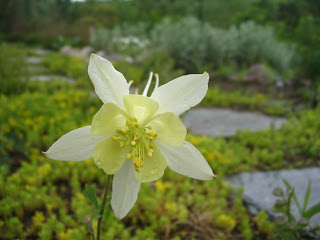
Earlier this year, I found a book at the library's perpetual used book sale in the basement. Though I had little time to read, being busy with my own school work and my children's school year activities, I looked forward to reading time in the summer. So, a very battered copy of Pearl S. Buck's The Exile was added to a rising stack of books "to be read." These past few days, I have immersed myself in that book whenever life allowed.
At first, I thought I was reading another of Pearl Buck's brilliant novels, set in China. As I read on, I felt that I was reading of a real life. This story did not follow the predictable plot patterns that I've come to expect after almost 40 years as a reader. Real life is not so neatly scripted, and this book read like real life. Further in, I began to suspect that I was reading the biography of Pearl Buck's mother, though no child named Pearl was ever born into the Christian missionary family about which I was reading. Could this little girl named Comfort be Pearl? With no book jacket to refer to, I sought information on the Internet. The Exile is indeed the story of Pearl's Comfort Buck's mother, Caroline, who lived most of her life in China surrounded by a culture that treated its women with disregard, surrounded by heat and disease, suffering and sorrow. Yet despite these dismal surroundings, there was in Carie, as she was called, a vital resilient spirit, both generous and compassionate.
As one expects from Pearl Buck, the writing is both intelligent and lyrical. In this passage, Buck describes her mothers perception of her environment, when they lived for a summer on a mountain top in two rented rooms of a temple:
"When the children lay sleeping and Carie fanned them as they slept, she pondered on the strangeness of her life, she whose room and home had looked out over sweeping meadows and clear country roadsides, over windswept, distant hills and wide skies - she sat here with her two children in a dark room in a Chinese temple, where through the round window she could look down a flagged path to the vast incense urn that stood outlined against the dense green of the bamboos. All through the night and day at long, regular intervals the temple bell reverberated its solitary, resonant note and echoed from the hillsides - a strange, mystic music filled with human sadness."
Tears streamed down my face as I read through some of the pages. I could understand this woman's spirit so well, as she lived with a determination to connect with others, to know them and hear their stories. As one paragraph explains, "There was always someone telling her story to Carie. The very chambermaids in the hotels were confiding in her by the end of the second day of her stay anywhere."
Our stories are important, but perhaps more important is being able to share them. Pearl S. Buck shared her stories through writing. Her mother told her own stories of growing up in America to her children as she raised them far away across the seas, but more importantly, she was the eager, caring listener to the stories of many broken Chinese women who thought their stories did not matter... until they met Carie. The way Carie lived her life reminds me of another favorite quote about stories, to go along with those I have on my right side bar:
"The universe is made of stories, not atoms." ~ Muriel Rukeyser.
photo by Haiku, June 19, 2008 pink dianthus against a blue sky























































